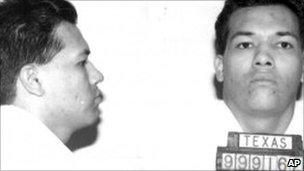Texas executes Mexican after US court rejects appeal
- Published

Humberto Leal was born in Mexico but came to the US as a small child
A Mexican citizen has been executed in the US state of Texas for the rape and murder of an American girl after the Supreme Court rejected a White House-backed appeal to spare the man's life.
Humberto Leal Garcia, 38, received a lethal injection on Thursday evening.
The Obama administration previously said the sentence would put the US in breach of international obligations.
Leal was not told he could have access to Mexican consular officials, in violation of the Vienna Convention. , external
Roughly one hour before Leal was taken to the death chamber, the Supreme Court justices voted 5-4 to allow the sentence.
The Texas parole board had also refused to halt the sentence, while Texas Governor Rick Perry rejected requests to intervene.
Leal was sentenced to death for the 1994 rape and murder of 16-year-old Adria Sauceda, whose body was found unclothed and beaten, hours after she was seen leaving a party with Leal in San Antonio.
The Mexican native moved with his family to the US as a small child.
'Serious repercussions'
In the death chamber, Leal said he admitted responsibility for the crimes.
"I have hurt a lot of people. ... I take full blame for everything. I am sorry for what I did," he said. "Let this be final and be done."
As the lethal drugs began to take effect he added: "One more thing: Viva Mexico! Viva Mexico!"
He was pronounced dead at 1821 (2321 GMT).
On Thursday afternoon, a state department spokeswoman said that the federal government had filed a brief with the US Supreme Court, supporting Leal's argument for a stay of execution until the end of the year.
US Solicitor General Donald Verrilli wrote in the brief that the execution would have "serious repercussions for United States foreign relations, law enforcement and other co-operation with Mexico, and the ability of American citizens travelling abroad to have the benefits of consular assistance in the event of detention".
The Obama administration had wanted a delay to allow Congress to consider legislation covering foreign nationals who were not given proper consular access before being tried for crimes that carry the death penalty.
The Mexican government said prior to the execution that the nation regarded it as a violation of international law.
"This is about the right that each person has under the Vienna Convention to be able to enjoy the support of their country of origin when they face criminal proceedings in a foreign country," the Mexican Foreign Ministry said.
Leal is one of 51 Mexican nationals on death row who were the focus of a 2004 ruling by the International Court of Justice, external (ICJ).
The ICJ said that their convictions should be reviewed because they were denied consular access.
President George W Bush told Texas officials they should comply with the ICJ order but the Supreme Court ruled that he had overstepped his authority.
In August 2008, Texas, which argued that its courts were not bound by the rulings of the ICJ, executed Mexican Jose Medellin.
"If you commit the most heinous of crimes in Texas, you can expect to face the ultimate penalty under our laws, as in this case," Texas spokeswoman Katherine Cesinger said.